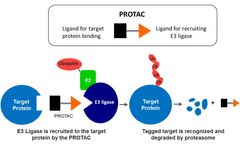Tumor Removal Articles & Analysis: Older
8 articles found
The study of protein-targeted degradation technology is mainly used to remove specific tumor proteins, and great breakthroughs have also been made in the study of autoimmune diseases and other treatments. ...
Interventional Oncology, the 4th pillar of modern cancer care Until the late 90s, modern cancer care consisted of three pillars of treatment: surgery (through tumor resection), radiation therapy, and chemotherapy. These pillars address tumors directly, removing or destroying lesions. ...
The robot arms move above the patient’s stomach as if guided by an invisible hand. Monitors on each side of the operating table show an oversized, 3-D image of the stomach’s interior. Two meters (about six feet) away, Dr. Markus Mille sits fully absorbed at the control ...
Optimal treatment for this tumor is surgery followed by radiation therapy. On August 31 he had complete resection of the tumor, which included partial removal of his laryngeal cartilages with preservation of his speech and swallowing functions. After removal of the tumor, while still in the operating room we ...
CURRENT STANDARD OF CARE FOR BRAIN TUMORS The current initial standard of care for aggressive brain tumors—whether they are primary brain tumors (ie, tumors that originate in the brain), or metastatic tumors from cancers that started outside of the brain—is resection. ...
CURRENT STANDARD OF CARE The current initial standard of care for aggressive brain tumors—either primary brain tumors (ie, tumors that originate inside the brain) or metastatic tumors (ie, tumors from cancers that originate outside of the brain)—is maximum safe surgical resection. ...
A trial involving ovarian cancer patients at Guildford’s Royal Surrey Hospital (UK) has found they have a higher chance of having all the tumour removed when undergoing surgery using argon plasma. Patients who participated in the ‘PlasmaJet® in Ovarian Cancer Surgery’ feasibility study were given a preview of the results as part of Ovarian Cancer Awareness Month recently. ...
A fibre-optic probe can detect errant cancer cells within healthy tissue during brain tumour surgery with close to 100 per cent accuracy and sensitivity, reducing the risk of recurrence and thereby increasing a patient’s survival time, say the Canadian researchers who developed the device. The hand-held, pen-like instrument, known as a Raman spectroscopy probe, is able to differentiate ...







